Grid lift makes gully lifting safer in Somerset
The introduction of the Penny Hydraulics' Grid Lift for mechanically lifting gully covers has significantly reduced accidents at Somerset Highways. The Grid Lift was introduced to one of the tankers at Atkins' Somerset Highways commission a year ago and accidents and working time lost through injuries caused by the manual handling of gully covers have reduced significantly since. As a result, Atkins has added a Grid Lift to four more tankers in Somerset and two in its contract in Gloucestershire. It is now rolling out the device to its other contracts in the UK.
"Since we installed the first Grid Lift we have had no accidents affecting gully crews," says Simon White, Network Contract Commission Manager at Atkins Somerset. "It really has made a difference."
"We were able to attribute £1927 to personnel cost for working days lost each year which is around eighty percent of the cost of a Grid Lift," says Simon White.
Penny Hydraulics worked closely with the Commission when developing the Grid Lift. The device can lift up to 300 kg for normal operations and is designed for installation on highways maintenance vehicles -- including vacuum tankers -- to lift gully and drain covers and eliminate the need for manual handling. It was devised to replace existing gully cover handling equipment such as electric winches as many operatives consider these to be unsafe and difficult to use. Mounted laterally on the tanker chassis, it incorporates two hydraulic rams, one to extend and retract the lifter, and one to lift and lower the gully lid. The hydraulic mechanism provides smooth, precise and accurate movements for the optimum combination of performance and safety. A separate frame locks onto the end of the vertical arm and attaches securely to the gully cover with simple twist keys. Remote control allows users to stand safely away from moving parts during lifting and lowering. The cover is lifted aside to provide operatives with clear access to the gully for safe and efficient cleaning and maintenance. Crews are able to clear each gully in less than two minutes.
"We think we've found a good solution," says Simon White. "Penny Hydraulics is not like other companies. They don't have off-the-shelf products and instead took our views on board and worked with us to develop the Grid Lift."
Since installing its first Grid Lift early in 2008, Somerset Highways has not had any accidents involving its gully crews and so there have been no working days lost through related injuries. The crews are also able to work more comfortably during the day because there is no tiring manual handling involved.
"The Grid Lift is having minimal impact on productivity and is easy to use" says Simon White. "Penny Hydraulics gave an initial briefing and showed our senior operators how to use it. They have now been using the device out in the field for over a year and their feedback has been extremely positive."
The Grid Lift has also made the overall gully cleansing process more efficient because it can be used to unseal covers that have become stuck in their frame. This avoids the need for a special crew to go out and rectify the problem.
"We're wasting less time and money," says Simon White. "This means the client also saves money and we achieve a higher success rate."
The Commission's use of the Grid Lift was recognized last year when it was runner-up in the Construction Industry Awards. Other health and safety initiatives introduced by the Commission have helped to reduce its overall accident rate by 76 percent in the last five years. In the future Somerset Highways hope to trial a new compact version of the Grid Lift on some of its jetting units. The Commission is encouraging its own subcontractors to use the Grid Lift and is actively promoting its success to other members of the Highways Term Maintenance Association.
"It's made a real difference to us and I would encourage others to use it," says Simon White. "The accident figures tell the story."
Penny Hydraulics designs, manufactures and services lifting and load handling equipment for use in a wide range of applications.
June 2009
###

